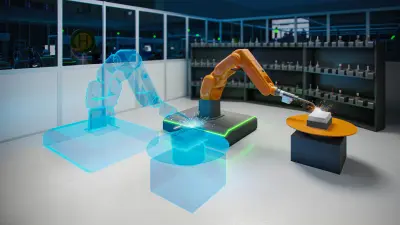Software-defined manufacturing: The goal is near
The project on the development and operation of production systems on the last stretch

Two thirds have been completed: The publicly funded project “SDM4FZI” (Software-defined manufacturing for the vehicle and supplier industry), which began in October 2021 with a duration of three years, is nearing the finish line. The aim of software-defined manufacturing (SDM) is to rethink the development and operation of production systems with established methods from IT. To this end, production applications are separated from hardware and infrastructure. Production applications are also software-defined, like apps on a smartphone. In both cases, be it a production system or a smartphone, the intended use is significantly characterized by the software-based applications used. This principle is being applied to industrial production in the publicly funded project “SDM4FZI”.
The range of tasks is large, which is why Bosch is acting as consortium leader with several organizational units that are working together on the software-defined manufacturing of tomorrow: The Bosch Connected Industry, Bosch Manufacturing Solutions and Bosch Research departments are dealing with the necessary information and production technology fundamentals and models. The Automotive Steering department provides requirements and offers production expertise. Bosch Rexroth is prioritizing the development of required digital twins.
The potential software-defined manufacturing holds for Bosch can be categorized into two groups: Firstly, the speed. Software-first approaches such as automated reconfiguration of production systems with optimization processes and virtual commissioning help to reduce a product’s time to market, for example. Secondly, the costs. Thanks to the modularization of hardware and software, a large portion of process modules, production stations and lines can be re-used. The effort required for reconfiguration is reduced.
A number of technological and conceptual pieces of the puzzle fit together to create the paradigm of software-defined manufacturing. Bosch Research has two main focuses in this regard. Virtualization of control technology, and modular und versatile production systems. The virtualization of control technology aims to shift machine control from the switch cabinet in the factory hall to a nearby server. One advantage is the update capability, for example. This way, older, less powerful control systems can be expanded with new, modern functions and errors in the application, known as “bugs”, can be rectified centrally. Among other things, Bosch is researching mechanisms for the realization of distributed and reliable (real-time) applications, as well as the automated distribution of configurations. In addition, the planning and reconfiguration of modular and adaptable production systems in particular needs to be accelerated in order to survive on the market. The usual linear planning approach is being transformed into iterative planning. This is characterized by combinable simulation and optimization tools for different planning tasks, which enables a more agile planning process. In order to fully utilize the potential of this approach, a modular and adaptable station concept is being developed; it will offer a high degree of flexibility due to the systematic separation of process modules and the basic production station.
The publicly funded SDM4FZI project is conducting application-oriented research in which results are often visualized using demonstrators. After the end of the project, the results will be transferred to specific applications that are industrially viable for Bosch in the years to come.